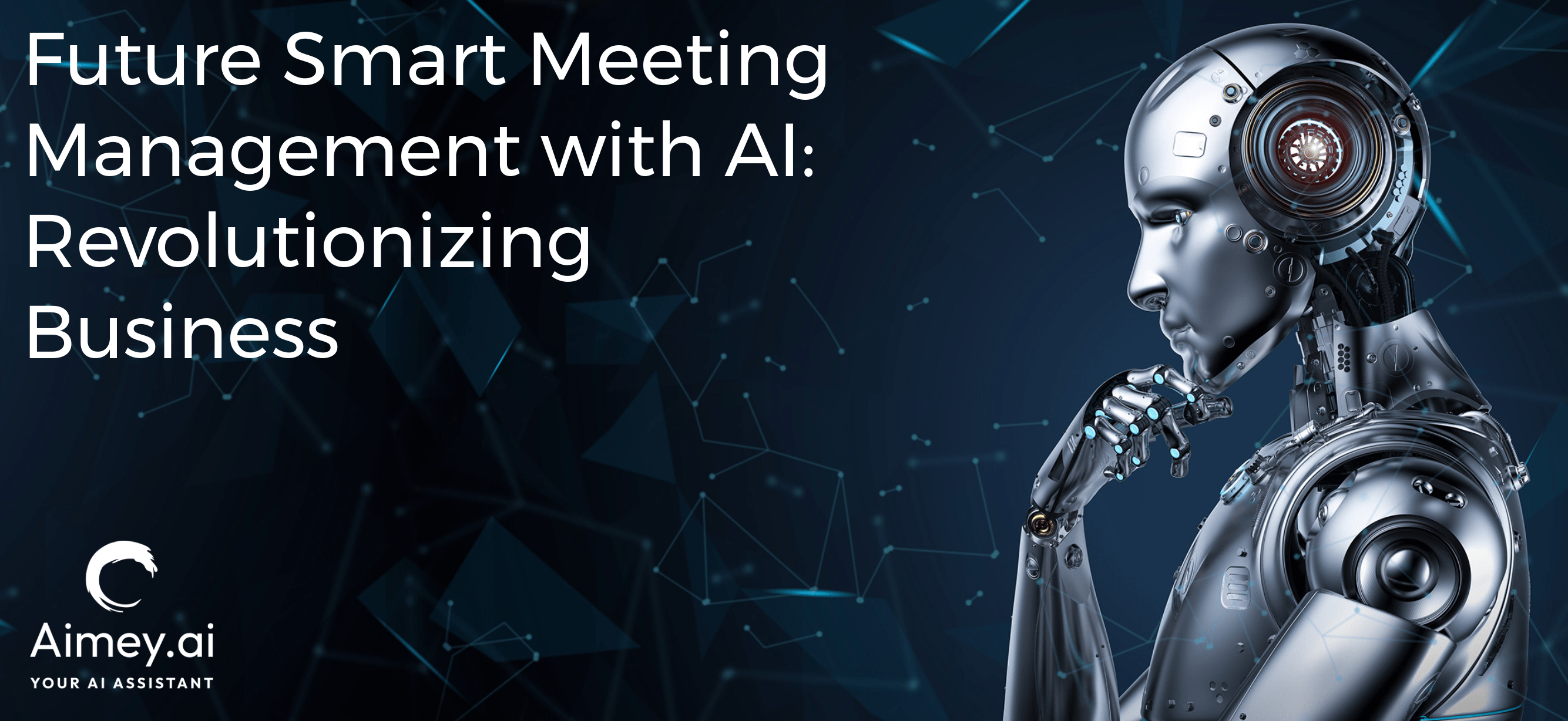Emergence of AI in Meeting Management: An Overview
Future smart meeting management with AI is transforming the corporate landscape, marking a significant shift from traditional, often time-consuming methodologies. The integration of artificial intelligence into meeting management introduces a myriad of benefits that streamline processes, enhance productivity, and foster more efficient decision-making. As we embark on this exploration, we uncover how AI is poised to revolutionize the way we conduct business meetings.
Transforming Business Meetings: The AI Revolution
The scope of AI’s impact extends far beyond just scheduling and reminders. AI-powered tools can analyze vast amounts of data to offer insights before, during, and after meetings. These insights help us optimize meeting agendas, identify key discussion points, and ensure that participants are well-prepared. This revolution extends to real-time transcription services, automated follow-ups, and predictive analytics that forecast future needs and trends based on past meeting data.
The Blueprint for Future Smart Meeting Management with AI
Creating a framework for future smart meeting management with AI starts with understanding the technology’s foundational elements. Key to this blueprint is the seamless integration of AI solutions into our existing workflows. By harnessing machine learning algorithms, natural language processing, and advanced predictive models, AI systems can become sophisticated assistants that manage and enhance every aspect of our meetings. This transformation not only improves efficiency but also elevates the overall quality of our interactions.
Enhancing Productivity: How AI Simplifies Meeting Planning and Coordination
In the rapidly evolving landscape of business, the need for efficient meeting management is greater than ever. Future smart meeting management with AI promises to revolutionize this aspect of business operation. AI can automate many of the mundane and time-consuming tasks associated with planning and coordinating meetings. For instance, AI can analyze participants’ calendars to find the best meeting times, send out invitations, and even prepare agendas tailored to the needs of all attendees.
Furthermore, AI-powered tools can assist in preparing meeting materials by summarizing past meeting notes, extracting key points, and distributing relevant documents ahead of the meeting. By automating these tasks, we are free to focus on more strategic activities, enhancing overall productivity and ensuring that every meeting is as effective and efficient as possible.
AI in Action: Real World Applications for Smart Meeting Management
Several enterprises have already started leveraging AI to enhance their meeting management processes. Applications like virtual assistants are a prime example. These digital aides can join meetings, transcribe conversations in real-time, and highlight action items and key decisions.
Another real-world application includes the use of AI for sentiment analysis. During meetings, AI can analyze the tone and mood of participants, providing insights into team morale and identifying potential issues before they escalate. These capabilities not only streamline operations but also foster a more engaging and productive meeting environment.
Additionally, post-meeting follow-ups are becoming increasingly efficient. AI can automatically generate and distribute meeting minutes, track action items, and send reminders to ensure tasks are completed on time. This level of automation ensures that nothing falls through the cracks and that every meeting yields tangible results.
Dissecting the Implications: The Pros and Cons of Future Smart Meeting Management with AI
While the benefits of future smart meeting management with AI are substantial, it’s also crucial to consider the potential drawbacks. Understanding both sides can help us make informed decisions about integrating these technologies into our processes.
- Pros:
- Increased Efficiency: Automating routine tasks frees us to focus on strategic initiatives.
- Enhanced Accuracy: AI reduces human errors in scheduling and coordinating meetings.
- Improved Engagement: Features like sentiment analysis help maintain positive team dynamics.
- Better Documentation: Automated minutes and action item tracking ensure thorough follow-ups.
- Cons:
- Privacy Concerns: AI systems need access to sensitive information, which could be a security risk if not managed properly.
- Dependence on Technology: Over-reliance on AI might reduce human oversight and intuition in decision-making.
- Cost: Implementing advanced AI solutions can be expensive and may require significant initial investment.
- Complexity: Integrating AI systems with existing tools and workflows can be challenging and time-consuming.
By weighing these pros and cons, we can approach future smart meeting management with AI in a balanced and strategic manner. Transitioning to AI-powered solutions offers immense potential for productivity and efficiency, but it’s essential to address the challenges thoughtfully.
Did you know? AI can reduce meeting planning time by up to 70% by automating scheduling, participant coordination, and agenda setting.
Preparing for the Future: What to Expect from AI-Driven Meeting Management
As we stand on the brink of a new era, it’s crucial to understand the profound changes that AI-driven meeting management will bring. The integration of AI into our meeting structures promises not only efficiency but also a significant transformation in how we collaborate and innovate. With the advent of these intelligent systems, we can expect meetings to become more streamlined, purposeful, and outcome-driven. The era of Future smart meeting management with AI is upon us, and the key lies in our readiness to embrace these advancements.
Leveraging AI for Better Meetings: Steps to Get Started
Implementing AI in our meeting management system is no longer a distant dream but an achievable goal. To leverage AI effectively, we must begin by identifying the specific pain points in our current meeting processes. Whether it’s scheduling conflicts, agenda mismanagement, or inefficient follow-ups, AI tools can address these challenges. Next, integrating platforms like aimey.ai can provide us with intelligent solutions tailored to our unique needs. Training our teams to adapt to these new tools and continuously refining our AI integration strategy will ensure we get the most out of this technological evolution.
Envisioning a New Era: Future Smart Meeting Management with AI
The landscape of business meetings is set for a radical transformation with AI at the helm. This new era, driven by advancements in artificial intelligence, promises a more interconnected and intelligent approach to meeting management. As we look forward to the future smart meeting management with AI, it’s essential to envision the broader possibilities: meetings that anticipate our needs, AI-driven insights that elevate decision-making, and automated systems that take care of mundane tasks, allowing us to focus on strategic and creative pursuits. The future is bright, and with the right tools and mindset, we are poised to lead in this new age of smart, efficient, and impactful meetings.
FAQ
What can we expect AI-driven meeting management to look like in the near future?
As we embrace AI-driven meeting management, we can anticipate meetings becoming more efficient and focused. AI technologies will assist in scheduling, setting agendas, and ensuring meetings are more dynamic and interactive. Additionally, AI will help by providing data-driven insights to enhance the decision-making process, ultimately leading to more productive outcomes. Importally, AI-driven tools will also free up time by handling repetitive administrative tasks.
How can AI improve the productivity of our meetings?
AI enhances productivity by streamlining the planning and coordination of meetings. With features like automatic scheduling, time tracking, and actionable insights on meeting effectiveness, AI allows the participants to concentrate on the core discussion points. Moreover, it can take care of follow-up actions, ensuring that decisions made during meetings lead to actual progress.
What are some steps to get started with integrating AI into our meeting management?
To integrate AI into meeting management, first identify the current challenges within your meeting processes. Once identified, integrate a platform that leverages AI to solve these specific issues. The next crucial step is to train your team on these new tools to maximize their benefits. Finally, continuously refine your strategy and tools to ensure they align with your evolving business needs.
What potential challenges should we be prepared for when adopting AI for meeting management?
While AI offers numerous advantages, it’s essential to be mindful of potential challenges such as the need for initial training, adjustments to new workflows, and ensuring data privacy and security. Furthermore, there can be a period of adaptation as both the AI system and the users learn and adjust to one another’s capabilities and patterns. It’s vital to have a clear implementation strategy and provide support during the transition.
In what ways will AI-driven insights elevate our decision-making in meetings?
AI-driven insights have the power to revolutionize decision-making by analyzing large volumes of data to uncover trends and patterns that might be missed by the human eye. Consequently, these insights can inform the strategic direction of discussions, provide a basis for more informed decision-making, and ultimately guide future planning and operations for maximum efficiency and effectiveness.

